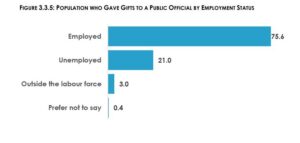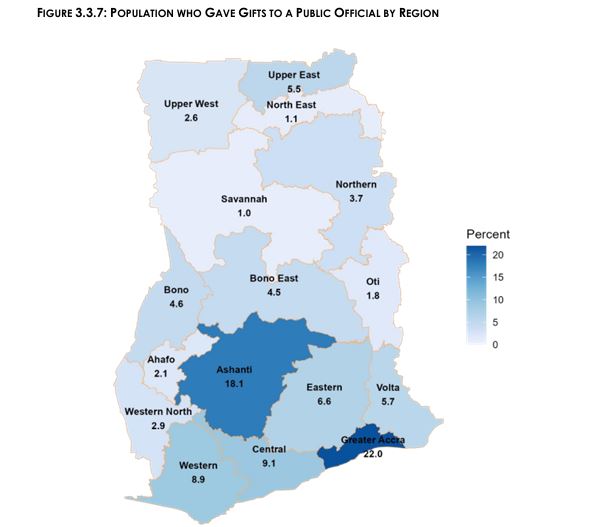By Juliet ETEFE ([email protected])
One in six persons who engaged public officials in 2024 paid bribes to access public services, the Ghana Statistical Service (GSS) has revealed in its newly launched Governance Series Wave 1 Report.
The study found that 18.4 percent of individuals who interacted with public officials within the year under review paid bribes, predominantly in the form of cash.
According to GSS, the study forms part of efforts to monitor Ghana’s performance on the Sustainable Development Goal (SDG) Indicator 16.5.1 which tracks the proportion of persons who paid or were asked to pay a bribe to a public official.
Conducted using a Computer-Assisted Telephone Interviewing (CATI) model, the survey reached 7,248 respondents across all 16 regions. Of those surveyed, 55.7 percent had at least one contact with a public official in the reference period from January to December 2024.
Bribery patterns by demographics
GSS data highlight troubling disparities in the distribution of bribe-giving as males accounted for 77.4 percent of those who paid bribes, with females constituting 22.6 percent.
Meanwhile, bribery was more prevalent in urban areas (61.9 percent) than in rural areas (38.1 percent).
In terms of age, the highest incidence of gift-giving occurred among persons aged 35 to 49 years – accounting for about 43 percent of all bribes paid. The trend was similar across education levels, with individuals possessing tertiary and JHS/middle-level education recording the highest figures.

The employed made up the bulk (75.6 percent) of those who gave bribes, but notably, 22.4 percent of unemployed persons reported paying over GH¢1,000 as bribes… revealing the economic burden corruption imposes on even the jobless.
Among persons with disabilities, approximately 21 percent reported paying bribes – with significantly higher rates among individuals with physical impairments (40.1%) and visual impairments (32.5 percent).

Institutional and regional trends
Institutional analysis revealed that the Motor Traffic and Transport Department (MTTD) of the Ghana Police Service recorded the highest bribe prevalence, with six in ten people who interacted with MTTD officials reporting they paid bribes. Other top-ranking institutions include general duties police (46.7 percent), police CID (37.9 percent) and city guards (34.4 percent).
On the flipside, the Minerals Commission recorded no reported cases of bribery and foreign embassies or consulates had just 2.6 percent of respondents reporting bribe-related interactions.
Geographically, Greater Accra (22 percent) and Ashanti Region (18.1 percent) had the highest incidences of bribery, while Savannah (1.0 percent) and North East (1.1 percent) reported the lowest.
Nature of bribes
Money remained the most dominant form of bribe, making up 85.2 percent of all gifts. Other items included food, drinks, animals (9 percent) and exchange of services (4.4 percent).
The amounts paid varied widely: about one-third paid between GHȼ101 – GH¢500 and 14% paid more than GHȼ1,000.
More males (15.6 percent) than females (10.8 percent) reported paying over GHȼ1,000. Similarly, urban residents paid more bribes than their rural counterparts. The Greater Accra Region again topped the chart for highest bribes paid.
A striking 74.9 percent of bribes were directly requested by public officials, either personally or through a third party. About 17.3 percent of respondents gave bribes voluntarily, either to facilitate the process or out of appreciation.
Yet only 14.5 percent of bribe incidents were reported to anti-corruption institutions, with urban dwellers more likely to report than rural residents.
Next steps
According to GSS, the first wave serves as a baseline for tracking governance-related experiences over time.
According to Government Statistician Dr. Alhassan Iddrisu, the report is a “call to action” and reflects the need for policies rooted in robust data.
“This evidence must be used to drive reforms, empower citizens and ultimately reduce corruption in public service delivery,” he stated.
The bi-annual Governance Series will follow up with the same respondents every six months to assess progress. The findings will also inform Ghana’s third Voluntary National Review (VNR) of the SDGs scheduled for July 2025.










